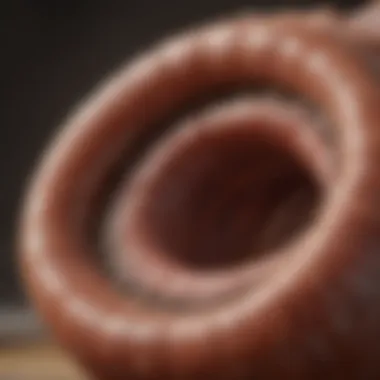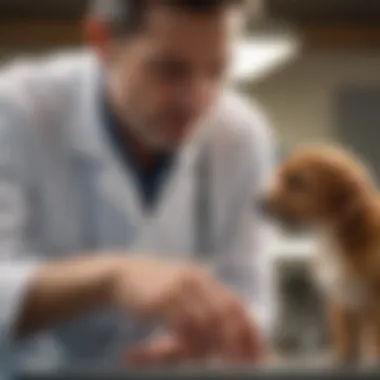When to Worry About Your Pet's Diarrhea


Intro
Diarrhea in pets is a common health issue that can be alarming for pet owners. It is essential to differentiate between mild digestive disturbances and serious health threats. Understanding the signs, causes, and appropriate responses can make a substantial difference to your pet's well-being. This article aims to guide you through the complexities associated with diarrhea in pets, shedding light on when it is necessary to seek veterinary attention and how to manage this condition effectively.
Understanding Your Pet
Pets are not merely companions; they are unique beings with specific needs and traits. Effective pet care starts with recognizing these needs.
Breed Traits
Different breeds can exhibit varied sensitivity to certain foods and environmental changes. For instance, small dogs may be more prone to digestive issues than larger breeds. Knowing whether your pet belongs to a breed that is commonly prone to gastrointestinal problems can help you be more vigilant.
Common Temperaments
A pet's temperament can influence how they respond to illness. Some pets may become more withdrawn, while others might show increased agitation when they are not feeling well. Monitoring behavioral changes can provide crucial information about their health status.
Special Needs
Certain pets may require specialized diets or care due to pre-existing conditions. If your pet has unique dietary restrictions or health needs, consider adjusting their meals accordingly. This proactive approach can assist in preventing episodes of diarrhea.
Identifying the Causes of Diarrhea
The causes of diarrhea in pets can vary significantly. It is important to assess the situation fully before jumping to conclusions.
- Dietary Changes: Sudden changes in diet can upset your pet's stomach.
- Food Intolerance: Some pets may have sensitivities to specific ingredients, which can trigger diarrhea.
- Infections: Bacterial, viral, or parasitic infections are common culprits.
- Stress: Situational stress from new environments, loud noises, or changes in routine can cause gastrointestinal upset.
When to Seek Veterinary Help
Recognizing the key indicators that necessitate a visit to the vet is essential for ensuring your pet's health.
Important: If diarrhea persists for more than 24 hours, or is accompanied by other symptoms like vomiting, lethargy, or blood in stool, a vet visit is crucial.
- Dehydration: Notice signs of dehydration, such as dry gums or excessive panting.
- Age of the Pet: Puppies and senior pets are more vulnerable to rapid health declines due to diarrhea.
- Underlying Conditions: Pets with pre-existing health issues need careful monitoring when experiencing gastrointestinal symptoms.
Prevention and Management Strategies
Preventing diarrhea is often easier than dealing with it once it occurs. Consider implementing the following strategies:
- Maintain a Consistent Diet: Avoid sudden changes in your pet's food.
- Monitor Treats: Ensure treats are suitable for your pet's dietary needs.
- Regular Vet Check-Ups: Routine check-ups can catch potential issues early.
Managing a case of diarrhea requires attentiveness and timely action. Ensure your pet stays hydrated and monitor their condition closely. Keep a log of any symptoms and changes in behavior, as this information can be invaluable for your veterinarian.
Epilogue
Being observant and knowledgeable about your pet’s health is vital. Understanding when to be concerned about diarrhea can help mitigate serious health risks. Familiarity with your pet’s specific needs and common triggers will empower you as a responsible pet owner. Keeping informed will equip you with the tools necessary for effective intervention and better health management for your beloved animal.
Overview of Diarrhea in Pets
Understanding diarrhea in pets is vry important for any pet owner. It can be a symptom of a range of health issues, and recognizing its severity is key to ensuring the wellbeing of your animal. Being informed allows owners to detect and respond to changes in their pet's health more rapidly.
Understanding Diarrhea
Diarrhea in pets refers to the condition where stool becomes loose or watery. It can be a single episode or occur more frequently. This condition can result from simple factors, such as diet changes, or more serious underlying health issues. It is crucial for owners to observe any instances of diarrhea, as chronic or severe cases can lead to dehydration and other complications.
Types of Diarrhea
Acute Diarrhea
Acute diarrhea is defined as a sudden onset of loose stools that typically lasts less than two weeks. This type is often caused by a sudden change in diet, stress, or exposure to toxins. Its key characteristic is that it usually resolves quickly, providing relief to the pet and owner. Acute diarrhea can be beneficial to address promptly since it often indicates an environmental or dietary issue rather than a systemic disease. However, if it persists, it may require veterinary attention to rule out more serious problems.
Chronic Diarrhea
Chronic diarrhea lasts for more than two weeks and can indicate an underlying health condition. This type of diarrhea is more concerning as it often reflects ongoing issues like allergies, inflammatory bowel disease, or infections. The key characteristic of chronic diarrhea is its persistence, which makes it vital for pet owners to monitor their pet’s health closely. Chronic diarrhea can be more advantageous to discuss in this article because it emphasizes the need for comprehensive assessment and long-term management.
Common Symptoms


Recognizing common symptoms associated with diarrhea is vital for pet owners. Symptoms might include:
- Frequent and watery stools
- Vomiting
- Loss of appetite
- Lethargy
Each of these symptoms can provide important clues about the pet's overall health. They should be noted alongside diarrhea to assess the seriousness of the condition more effectively. Understanding diarrhea’s symptoms can help in deciding when to seek professional veterinary help.
Causes of Diarrhea
Understanding the causes of diarrhea is critical for pet owners. It helps identify when diarrhea might be a simple issue or when it could indicate a more serious health concern. Various factors contribute to diarrhea in pets, and knowing these can lead to quicker recovery times and better overall health. Not only does recognizing the causes allow for effective treatment, but it also aids in prevention.
Dietary Indiscretion
Dietary indiscretion is a common cause of diarrhea in pets. It often happens when pets eat something they shouldn't, like stale food, human leftovers, or foreign objects. This sudden change in diet can disturb their digestive systems. When a pet consumes inappropriate food, their body may react negatively, leading to loose stools. Recognizing this as a cause can help owners adjust their pet's diet accordingly and prevent future incidents.
Infections
Infections are another significant reason behind diarrhea. These can be classified into three main categories: bacterial, viral, and parasitic infections. Each category has its own implications for your pet's health.
Bacterial Infections
Bacterial infections such as Salmonella or E. coli can lead to severe diarrhea in pets. These infections often stem from contaminated food or water. A key characteristic of bacterial infections is their potential for quick transmission. Pets can become ill very fast after exposure. They may exhibit symptoms like fever, vomiting, or lethargy. The unique feature of bacterial infections is that they can be treated with antibiotics, however, not all bacteria are susceptible. It’s crucial to identify the right bacteria for effective treatment.
Viral Infections
Viral infections, such as parvovirus or coronavirus, also contribute to diarrhea in pets. These infections can be especially dangerous, leading to rapid dehydration. One important aspect of viral infections is that they can spread quickly, particularly in environments with multiple pets. Vaccination is often the best prevention for certain viral infections. Their unique feature is that management requires more than just antibiotics; supportive care, including fluids and rest, is often necessary in treating viral infections.
Parasitic Infections
Parasitic infections, like those caused by roundworms or Giardia, are another factor that can lead to diarrhea in pets. They often come from contaminated environments or improper hygiene practices. A key characteristic of parasitic infections is that they can persist for a long time if not treated. They can significantly affect your pet's health and lead to nutritional deficiencies. The unique feature of these infections is that they require specific antiparasitic medications for treatment. Regular veterinary check-ups can help prevent these infections by identifying them early.
Food Intolerances and Allergies
Food intolerances and allergies can also cause diarrhea in pets. Unlike dietary indiscretion, these conditions result from specific ingredients in their food. Pets may develop sensitivities over time or may be born with them. Identifying the source can be challenging. Symptoms can vary and may require extensive testing and dietary changes. Knowing about food intolerances or allergies can lead to a more balanced diet, improving your pet's digestive health.
Assessing the Severity of Diarrhea
Assessing the severity of diarrhea in pets is crucial for pet owners. Recognizing when diarrhea poses a risk goes beyond understanding its frequency or consistency. It involves a comprehensive view of the pet's overall health, which includes additional symptoms and the duration of the condition.
Understanding the severity helps in making informed decisions regarding veterinary care. Early intervention can prevent complications and ensure the well-being of the pet. When evaluating severity, certain key factors must be closely monitored.
Frequency and Consistency
Frequency and consistency of the stool are major indicators of diarrhea severity. If a pet experiences loose or watery stool more than three times a day, it is a cause for concern. The consistency such as watery versus semi-formed is also significant. Watery stool may indicate a more serious underlying issue than slightly loose stool. Moreover, if the stool appears unusually foul-smelling, this could signal an infection or other health problem.
Presence of Additional Symptoms
Vomiting
Vomiting alongside diarrhea is an important concern. It often indicates a more severe condition, like infections or gastrointestinal distress. The presence of both symptoms can lead to dehydration, which is a serious health risk. Vomiting can also signal food intolerance or mild poisoning. Monitoring the occurrence and frequency of vomiting helps in determining the urgency needed for veterinary care.
Lethargy
Lethargy is another symptom to consider. If a pet shows a significant drop in energy, it may point toward a more serious issue. A lethargic pet may struggle to engage in normal activities like playing or eating. This symptom indicates distress and can be a sign of dehydration or systemic illness. Maintaining awareness of your pet's energy levels can provide insight into their health status.
Loss of Appetite
Loss of appetite often accompanies diarrhea. When a pet refuses food, it may suggest pain, nausea, or a more profound digestive problem. This is a key indicator that an animal's health is compromised. Extended periods without eating can exacerbate dehydration and weaken the pet. Tracking changes in appetite should be considered a critical aspect in assessing the seriousness of the situation.
Duration of Diarrhea
The duration of diarrhea also plays a pivotal role in judgment. If diarrhea persists beyond 24 hours, it warrants veterinary attention. Prolonged diarrhea can lead to severe dehydration and nutritional deficiencies. Observing for any changes over time can provide vital information for the veterinarian regarding treatment options.
It is essential to monitor both the symptoms and the overall condition of the pet to determine when to seek further medical assistance.
In summary, thorough assessment of the severity of diarrhea includes monitoring frequency, consistency, the presence of additional symptoms, and duration. These aspects provide a clearer picture of a pet’s health, helping owners take the necessary steps when issues arise.
When to Seek Veterinary Help


Understanding when to seek veterinary help for your pet’s diarrhea is essential for any responsible owner. Diarrhea can be a minor issue, but in some cases, it signals a more serious health problem that requires medical attention. Recognizing the factors that warrant a visit to the veterinarian can make a significant difference in your pet's health and recovery rate. Quick action might prevent complications and lead to better outcomes.
Underlying Health Conditions
Underlying health conditions can exacerbate diarrhea. Some pets might have pre-existing illnesses such as diabetes, kidney disease, or inflammatory bowel disease. These conditions often weaken the animal’s immune system, making them more susceptible to gastrointestinal disturbances. It is crucial to know your pet’s medical history when faced with diarrhea.
Discuss with your veterinarian about any ongoing health issues your pet might have. They may recommend diagnostic tests to rule out serious concerns or to monitor existing conditions affecting your pet's digestive health. Regular checkups can catch underlying problems early.
Severe Symptoms
Blood in Stool
Blood in the stool is an alarming sign that needs immediate attention. It may indicate serious issues, such as internal bleeding or severe infections. Blood can appear as bright red streaks or tarry black clots, both of which are concerning. This sign often necessitates further investigation to determine the root cause, which can range from dietary indiscretion to more severe health conditions. Prompt veterinary intervention can help identify effective treatments quickly.
Dehydration
Dehydration is a common consequence of diarrhea. With frequent bowel movements, pets can lose significant fluids, leading to this serious condition. Symptoms of dehydration include increased thirst, dry gums, and lethargy. In some cases, skin elasticity decreases, and the animal appears sluggish. If dehydration sets in, it can lead to complications affecting overall health. Therefore, monitoring fluid intake and being alert to signs of dehydration is crucial in pets with diarrhea.
Severe Abdominal Pain
Severe abdominal pain can be another indicator that something serious is going on. This discomfort could stem from various sources, including organ disease or intestinal obstruction. Signs of severe pain might include whining, restlessness, or a reluctance to be touched in the abdomen. If such symptoms appear alongside diarrhea, talking to a veterinarian is vital. They can assess your pet's condition and recommend an appropriate response.
Duration of Symptoms Beyond Hours
Lastly, if diarrhea lasts more than 24 hours, it is time to seek professional help. Prolonged symptoms may signify a more serious issue that needs to be addressed. In some cases, chronic diarrhea can lead to significant health problems, including malnutrition or further digestive issues. Keeping track of how long your pet has been ill can help the vet make informed decisions regarding diagnosis and treatment.
Seeking veterinary help can prevent minor issues from becoming major crises for your pet. Being proactive saves time and secures better health outcomes.
Potential Complications of Diarrhea
Diarrhea in pets may seem like a minor issue, yet it has potential complications that can escalate if not addressed promptly. Understanding these complications is essential for pet owners, as they direct attention to the urgency of the situation. Knowing what could happen if diarrhea continues can lead to better monitoring and quicker vet visits. Therefore, let's delve into the specific complications associated with diarrhea.
Dehydration Risks
One of the most immediate concerns linked to diarrhea is dehydration. Liquid bowel movements lead to significant fluid loss in pets. If a pet is not able to replenish this lost fluid, it can lead to dangerous health consequences.
Signs of dehydration include:
- Dry gums
- Excessive thirst
- Lethargy
- Increased heart rate
When dehydration occurs, it is critical to provide immediate care. Fluid therapy may be necessary, and this is best administered through a veterinarian. Ignoring dehydration can result in organ failure, and the severity of the situation may escalate rapidly.
Nutritional Deficiencies
Chronic diarrhea can interfere with the absorption of essential nutrients. Nutritional deficiencies can evolve when a pet continues to experience digestive upset without appropriate dietary modification.
Pets may experience:
- Weight loss
- Weakness
- Poor coat condition
- Muscle wasting
Inadequate nutrient absorption can affect energy levels and overall vitality. Therefore, addressing ongoing diarrhea with proper dietary adjustments is vital. Regular veterinary check-ups can help ensure that a pet remains healthy and that any deficiencies are promptly managed.
Impact on Overall Health
The impact of diarrhea goes beyond immediate symptoms. If left unchecked, diarrhea can compromise a pet's overall health. Prolonged diarrhea not only causes dehydration and nutritional shortcomings but also stresses other bodily systems.
Consequences of prolonged diarrhea may include:
- Weak immune system
- Increased vulnerability to infections
- Slower recovery from illnesses
In some cases, ongoing digestive problems can indicate underlying health conditions, such as liver disease or inflammation. Therefore, a thorough veterinary examination is essential to rule out serious issues.
In summary, monitoring a pet's digestive health is crucial. Potential complications from diarrhea should not be underestimated.
By recognizing the risks associated with diarrhea, pet owners can act swiftly and effectively to safeguard their pet’s health, ensuring a happier and healthier life.


Management and Care at Home
Managing diarrhea in pets requires a careful approach at home. This section dives into the essential practices owners can implement to care for their pets effectively. The management strategies discussed can prevent further complications and promote recovery. Owners should be familiar with both dietary adjustments and careful monitoring, as these are pivotal in ensuring a pet's health standard during diarrhea episodes.
Dietary Adjustments
Dietary adjustments play a significant role in the management of diarrhea. Altering a pet's food can lead to noticeable improvements in their digestive health.
Bland Diet Recommendations
A bland diet is specifically designed for pets suffering from diarrhea. This involves offering easily digestible foods. Common options include boiled white rice and plain, boiled chicken without skin or spices. The key characteristic of a bland diet is its simplicity, making it a popular choice among pet owners. It reduces the workload on a pet's digestive system and can help stabilize their stools more quickly.
The unique feature of a bland diet is that it allows the digestive system to recover while minimizing irritation. One advantage is that these foods are often palatable for pets, encouraging them to eat during a time when normal appetite may decrease. However, it is critical to note that this is a temporary solution. Prolonged adherence to a bland diet can lead to nutritional deficiencies, so it should not replace a balanced diet once the pet recovers.
Hydration Maintenance
Hydration maintenance is crucial during episodes of diarrhea. Pets rapidly lose fluids, which poses a risk of dehydration. The key aspect of hydration maintenance is ensuring that pets have constant access to fresh and clean water. In some cases, offering an electrolyte solution designed for pets can also help replenish lost fluids more effectively.
The unique feature of hydration maintenance is how it mitigates the risk of serious health issues associated with dehydration. Regular monitoring of the pet's water intake can help gauge hydration status. An advantage is that keeping pets well-hydrated can often lead to a faster recovery. However, a downside to consider is that some pets may not drink enough water on their own, which may require additional methods, such as offering water-rich foods like broths or specially formulated wet foods to encourage them to re-hydrate.
Monitoring and Observation
Monitoring and observation are vital during a pet’s recovery from diarrhea. Owners should keep a close eye on their pet's behavior, stool quality, and overall health. Noting changes in activity levels, appetite, and mood can provide valuable information. Documentation can be useful, particularly when consulting a veterinarian. Regular observation may allow for early detection of any worsening conditions.
When to Avoid Home Remedies
While home remedies can sometimes be beneficial, there are situations where they might not be appropriate. For instance, if the pet shows signs of severe dehydration, the presence of blood in the stool, or any severe symptoms described earlier, it is crucial to avoid self-treatment. Such conditions require immediate veterinary attention. Owners should be cautious with various home preparations; some may not be suitable for all pet breeds or health conditions.
Remember: When in doubt about your pet's health status or the effectiveness of any home treatment, seek professional veterinary guidance.
These home management strategies ensure that pet owners can provide appropriate care to their furry companions while keeping a watchful eye for any signs signaling the need for professional intervention.
Preventive Measures
Preventive measures play a crucial role in managing diarrhea in pets. By taking proactive steps, pet owners can significantly reduce the chances of diarrhea occurring. Understanding and implementing these strategies may not only minimize risks but can also protect the overall health and well-being of the pets. Here, we explore the key aspects of preventive measures, including proper nutrition, regular veterinary visits, and hygiene practices.
Proper Nutrition
Proper nutrition is fundamental in maintaining the health of a pet. A balanced diet supports the digestive system and minimizes gastrointestinal disturbances. Pet owners should consider the following:
- High-Quality Ingredients: Select pet food that contains whole, natural ingredients. Avoid foods with fillers or artificial additives.
- Appropriate Portion Sizes: Feeding pets the right amount is essential. Overfeeding or underfeeding can lead to digestive issues.
- Gradual Dietary Changes: When switching foods, make the transition gradual. Sudden changes can upset the digestive system.
- Regular Feeding Schedule: Establish a consistent feeding routine. Regular meal times can aid digestion and reduce anxiety related to food.
By adhering to these dietary guidelines, the risk of diarrhea can be minimized, creating a more stable digestive environment.
Regular Veterinary Visits
Regular veterinary check-ups are vital for the early detection of health issues. Through these visits, veterinarians can assess a pet’s general health and catch potential problems that could lead to diarrhea. Considerations for regular veterinary care include:
- Routine Health Screenings: Regular examinations can identify underlying health conditions before they escalate into serious issues.
- Vaccination Updates: Ensure vaccinations are up to date to protect against diseases that can cause diarrhea.
- Dietary Consultations: A vet can provide tailored dietary advice based on a pet’s specific needs and health conditions.
- Parasite Control: Regular deworming and flea treatment help to prevent parasitic infections that can lead to gastrointestinal disturbances.
Frequent veterinary visits create not only a safety net for pets but also provide peace of mind for owners.
Hygiene Practices
Maintaining proper hygiene is essential in preventing diarrhea in pets. Good cleanliness habits can minimize exposure to harmful bacteria and parasites. Here are some important practices:
- Cleaning Food and Water Bowls: Regularly wash and sanitize bowls to prevent bacterial growth. Clean bowls should be a standard requirement in a pet-friendly home.
- Daily Waste Removal: Promptly clean up after pets to minimize exposure to pathogens in fecal matter.
- Regular Bathing and Grooming: Regular grooming helps to reduce the risk of skin infections and keeps the pet clean, which can indirectly support digestive health.
- Controlled Environment: Limit pets’ exposure to unknown environments where they might ingest harmful substances.
By instilling these hygiene practices, pet owners can create a cleaner environment that promotes health and reduces the chance of diarrhea.
Proper preventive measures can significantly lower the risk of diarrhea, leading to a healthier, happier pet.
The End
Understanding diarrhea in pets is important for any owner. The consequences of ignoring symptoms can lead to serious health issues. This article highlights the causes, assessment techniques, and management strategies for diarrhea, focusing on when to worry.
Summary of Key Points
- Diarrhea Evaluation: Watch out for frequency, consistency, and any additional symptoms.
- When to Seek Help: If diarrhea lasts more than 24 hours, or if you see signs like blood, dehydration, or vomiting.
- Preventive Measures: Proper nutrition and hygiene practices are vital for preventing diarrhea.
Final Recommendations
It is essential to remain vigilant if your pet shows signs of diarrhea. Make dietary adjustments and maintain hydration. If symptoms persist, do not hesitate to contact a veterinarain. Always remember that early intervention can significantly result in better outcomes for your pet's health. Regular check-ups with the vet can also help in the prevention of health issues related to diarrhea.



